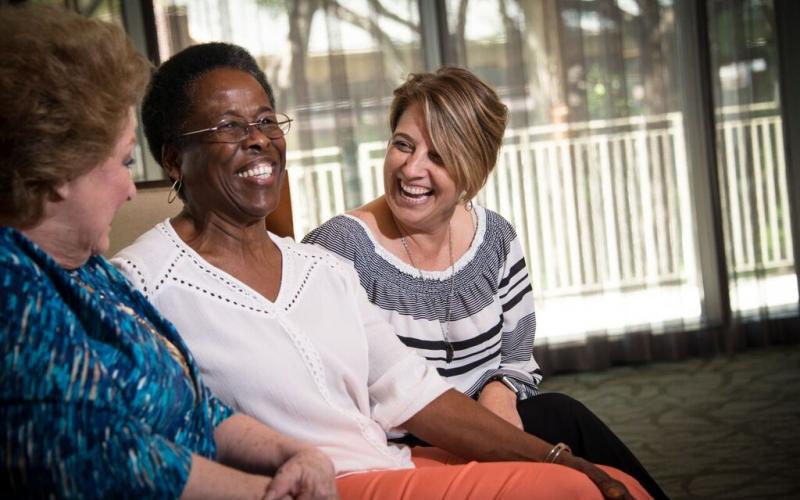Do I Need an Aid?
My first true learning experience about Alzheimer’s began at the point when it became personal. Back in the early 2000s, I had a close colleague who worked in an adult day care center. This small and colorful center helped care for a storied group of individuals with whom I had the pleasure of interacting.
Mr. Sullivan was a favorite resident of mine. He was a tall man who spoke softly and performed a balancing act of being impeccably polite and warm. He seemed to take a genuine interest in what everyone else around him was saying, and he would play Connect Four with me while never shaming me for not knowing how to play chess.
Once while I was visiting, my colleague mentioned, “Mr. Sullivan was just diagnosed with Alzheimer’s, but you might not notice it yet.”
It suddenly struck me how simplistic my view of Alzheimer’s had been. At the time, my misinformed view was that the only presentation of the disease was automatically forgetting everything and everyone at once.
I didn’t expect the small hurt of having Mr. Sullivan forget who I was while he struggled to remember my name so as to not seem impolite.
Alzheimer’s brings about massive change—sometimes slowly, sometimes rapidly. To adjust to this challenging new set of circumstances takes grace and grit. One thing psychologists recommend to smooth this transition, both for the one diagnosed and for the family, is proactive decision making. It is helpful to have a plan in place before a crisis forces a big life decision overnight or in a panicked state.
The most helpful caregiving plans vary from family to family. For Mr. Sullivan and his family, the best plan was to provide part-time care for him themselves while hiring professional care during the day. Mr. Sullivan was able to make a smoother transition to various levels of memory care because he talked about it early with loved ones.
This proactive approach is something to be emulated by those navigating memory loss, particularly when thinking about hiring an in-home aid.
Those considering hiring an aid should begin with a few key questions: Am I physically able to care for this person? Am I qualified to care for this person? Is it likely that this person’s condition will get worse and I won’t be prepared?
Should the time be right for an aid, it is highly recommended to hire through an agency licensed by the Health and Human Services Commission, known as Personal Assistance Services (PAS). While it may be tempting to look into hiring a private aid, PAS agencies are able to provide many protections unavailable through an unlicensed private aid.
For example, licensed PAS agencies are able to verify that their aids have a clean driving record and automobile insurance should they need to transport clients. They also run screenings and offer ongoing training that private workers are not likely to have completed. PAS agencies are required to provide criminal history checks, as well as checks into both the Nurses Aid Registry and Employee Misconduct Registry. This makes hiring an aid through an agency a much safer option for a loved one.
Working with a licensed agency offers greater peace of mind for families and creates better working conditions for the aids. If an aid suddenly gets sick or has a family emergency, PAS agencies are able to provide support or backup care for patients, providing support for the aid and relieving the family of the burden of finding a substitute.
For some people affected by Alzheimer’s, the right choice may eventually mean moving into a senior living community. The decision to leave home isn’t an easy one, but it may be the safest and healthiest option for everyone. Some senior living communities provide residences and care across the continuum—from independent living to hospice and end-of-life care. While a move may seem daunting at first, it can provide access to thorough medical supervision and structured routines implemented by specially trained staff. Family members often report an improvement in their relationship with their loved one following a move as they transition from the sometimes grueling role of caregiver back to the role of loving spouse/child.
Speaking with an expert can make a diagnosis and care more manageable. If you’d like to learn more about caregiving options for someone with Alzheimer’s, consider attending EdenHill Communities’ Alzheimer’s Symposium on October 22nd. The event is free and open to the public. Speakers will include Dr. Mark Burns, a geriatric and general psychiatrist with a New Braunfels-based practice, and Dianne Teran with the Alzheimer’s Association who will discuss COVID-19 and Alzheimer’s. With the option to attend the event virtually or in-person (with social distancing measures in place), RSVPs are required. To learn more or to register, visit www.edenhill.org/symposium or call 830-625-1324.

